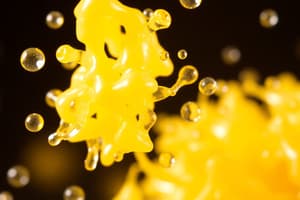Podcast
Questions and Answers
What is the role of iodine solution in this experiment?
What is the role of iodine solution in this experiment?
To test the presence of starch in the solution.
How is the starch solution prepared for the experiment?
How is the starch solution prepared for the experiment?
By dissolving 10 grams of starch in 100 ml of water.
What is the source of salivary amylase for the experiment?
What is the source of salivary amylase for the experiment?
Saliva.
At which temperature is salivary amylase most active in this experiment?
At which temperature is salivary amylase most active in this experiment?
What is the optimal pH for salivary amylase activity?
What is the optimal pH for salivary amylase activity?
What is the observed change in the starch solution after the action of salivary amylase?
What is the observed change in the starch solution after the action of salivary amylase?
What is the maximum activity temperature for salivary amylase in the experiment?
What is the maximum activity temperature for salivary amylase in the experiment?
How is the starch solution prepared for the experiment?
How is the starch solution prepared for the experiment?
What affects the activity of salivary amylase in the experiment?
What affects the activity of salivary amylase in the experiment?
How do students maintain different pH levels during the experiment?
How do students maintain different pH levels during the experiment?
What happens to the proteins and enzymes at high temperatures in the experiment?
What happens to the proteins and enzymes at high temperatures in the experiment?
What indicates starch degradation in the experiment?
What indicates starch degradation in the experiment?
The activity of salivary amylase is tested by adding ______ to the starch solution
The activity of salivary amylase is tested by adding ______ to the starch solution
To prepare the starch solution, 10 grams of starch is dissolved in 100 ml of ______
To prepare the starch solution, 10 grams of starch is dissolved in 100 ml of ______
The pH level of the solution also affects the activity of salivary amylase, with optimal activity occurring at pH ______
The pH level of the solution also affects the activity of salivary amylase, with optimal activity occurring at pH ______
At high temperatures, the proteins and enzymes get degraded and lose their ______
At high temperatures, the proteins and enzymes get degraded and lose their ______
Students add salivary amylase to the test tubes and observe the ______ change in the iodine solution, indicating starch degradation, after some time
Students add salivary amylase to the test tubes and observe the ______ change in the iodine solution, indicating starch degradation, after some time
The experiment can be performed at different temperatures, with maximum activity occurring at ______ degrees Celsius
The experiment can be performed at different temperatures, with maximum activity occurring at ______ degrees Celsius
Flashcards are hidden until you start studying
Study Notes
- The experiment involves observing the action of salivary amylase on starch at different temperatures and pH levels.
- The first requirement is a starch solution, which is prepared by dissolving 10 grams of starch in 100 ml of water.
- Salivary amylase, an enzyme present in saliva, is added to the starch solution for the experiment.
- The presence of starch in the solution is tested using an iodine solution, which turns blue in the presence of starch.
- To extract saliva for the experiment, participants can imagine a delicious food or roll their tongue over their palate to collect saliva.
- The iodine test is performed twice: once before adding salivary amylase and once after.
- Salivary amylase breaks down starch into disaccharides, which can be observed as a change in color with the iodine solution.
- The experiment is repeated at different temperatures: 20 degrees Celsius, room temperature (37 degrees Celsius), and 70 degrees Celsius.
- Salivary amylase is most active at a temperature of 37 degrees Celsius, and the activity decreases at higher and lower temperatures.
- The experiment is also conducted at different pH levels: acidic (pH 4), neutral (pH 7), and basic (pH 9.2).
- The optimal pH for salivary amylase activity is around 6.8, and the enzyme is least active in acidic and basic conditions.
Studying That Suits You
Use AI to generate personalized quizzes and flashcards to suit your learning preferences.



